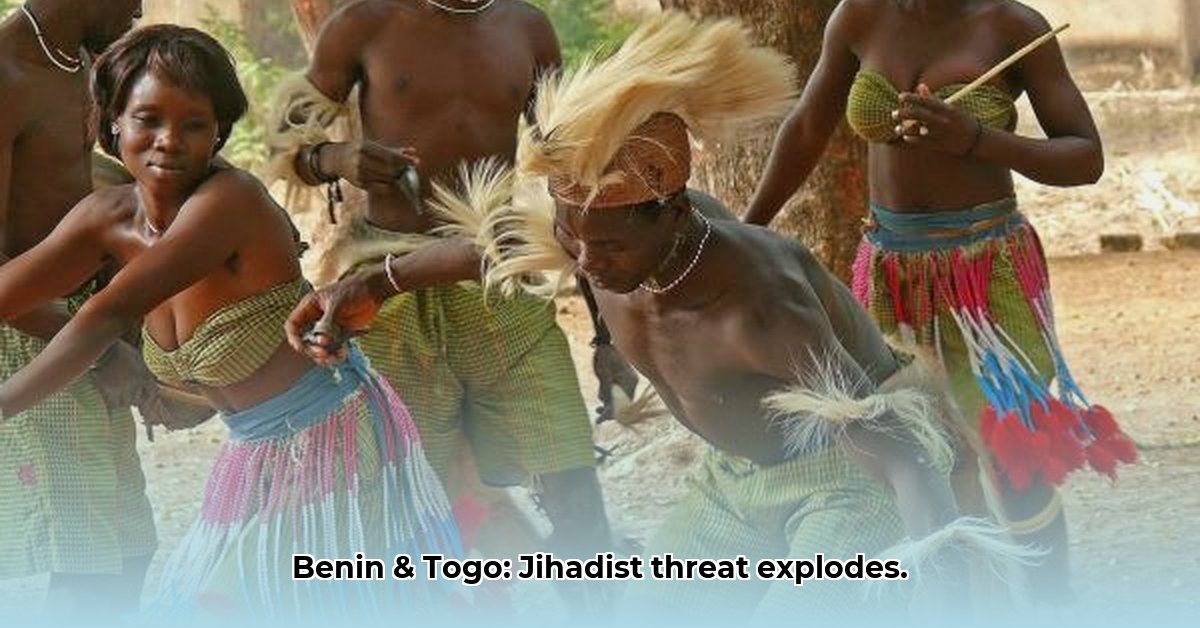A Looming Shadow: Jihadist Insurgency in Benin and the Regional Spillover
Benin, once an island of relative stability in West Africa, finds itself increasingly engulfed in a surge of jihadist violence, spearheaded by Jama’at Nusrat al-Islam wal-Muslimeen (JNIM). This escalating threat transcends national borders, posing a significant risk to regional stability, particularly in neighboring Togo. The interconnected nature of West African societies, coupled with porous borders and shared ethnicities, facilitates the rapid spread of instability. The stark rise in violent incidents, from 22 in 2021 to a staggering 176 in 2024 (according to ACAPS data), underscores the urgency of the situation. This crisis demands a comprehensive strategy that moves beyond a purely military approach, addressing the complex interplay of security concerns, socio-economic vulnerabilities, and the need for robust regional cooperation.
Benin’s northern regions, characterized by persistent poverty, limited economic opportunities, and a sense of marginalization, have become a fertile recruiting ground for jihadist groups. The stark economic disparity between the relatively prosperous south and the underdeveloped north fuels resentment and creates an environment ripe for the allure of extremist ideologies. This analysis will delve into the multifaceted nature of this crisis, exploring the underlying socio-economic drivers, the role of regional dynamics, and the imperative for a comprehensive, collaborative response.
Unraveling the Roots: Socio-Economic Vulnerabilities and the Rise of Extremism
The current wave of jihadist insurgency in Benin isn’t solely a security issue; it’s deeply intertwined with complex socio-economic factors. Poverty, lack of access to education and healthcare, ethnic tensions, and weak governance create a breeding ground for extremism. Jihadist groups skillfully exploit these vulnerabilities, offering a sense of belonging, purpose, and economic incentives to disenfranchised youth, particularly in marginalized communities.
Northern Benin’s unique geographic and socio-economic landscape makes it particularly susceptible to extremist influence. The porous borders with Burkina Faso and Niger, coupled with the presence of the vast WAP National Park, provide safe havens and logistical corridors for jihadist operations. Furthermore, the complexities of artisanal mining, often unregulated and informal, can inadvertently finance extremist activities. These interconnected challenges demand a multifaceted response that extends beyond military interventions. Sustainable solutions must prioritize good governance, inclusive economic development, targeted investments in education and job creation, and genuine engagement with local communities.
The Imperative of Regional Cooperation: A Collective Response to a Shared Threat
The transnational nature of the jihadist threat underscores the critical need for robust regional cooperation. However, recent political instability and security challenges across the Sahel region have hampered existing frameworks, hindering effective intelligence sharing, joint operations, and coordinated responses. Revitalizing regional security architectures is paramount.
The Economic Community of West African States (ECOWAS) plays a crucial role in coordinating military responses, facilitating intelligence sharing, and providing logistical support. Strengthening ECOWAS mechanisms, enhancing joint military exercises and training programs, and fostering greater interoperability among national security forces are essential steps. Beyond ECOWAS, broader international collaboration, involving partners like the African Union, the United Nations, and key bilateral partners, is equally crucial. This collaborative approach must include not only governments and regional organizations but also civil society organizations, local communities, and religious leaders to build resilience from within.
A Roadmap for Regional Stability: Actionable Intelligence and Collaborative Engagement
| Stakeholders | Short-Term Actions (0-1 Year) | Medium-Term Actions (1-3 years) | Long-Term Actions (3-5 Years) |
|---|---|---|---|
| Beninese Government | Enhance border security, deploy specialized counter-terrorism units, establish community policing initiatives, invest in immediate humanitarian assistance. | Conduct comprehensive socio-economic assessments in affected regions, implement pilot development projects, strengthen local governance structures. | Invest in security sector reform, promote sustainable economic growth in the north, foster inclusive governance, enhance regional partnerships. |
| Regional Organizations (ECOWAS, AU) | Increase joint patrols and cross-border operations, establish a regional intelligence fusion center, provide logistical and financial support to member states. | Develop a comprehensive regional counter-terrorism strategy, conduct joint training exercises focusing on asymmetric warfare, enhance information sharing mechanisms. | Develop regional security strategies that address root causes, create cross-border development initiatives, promote regional economic integration. |
| International Community | Provide financial and technical assistance for security sector reform, offer training and equipment for counter-terrorism units, support humanitarian aid efforts. | Fund and support development projects focused on education, vocational training, and job creation in vulnerable communities, promote good governance and human rights. | Maintain long-term development assistance, monitor human rights and democratic governance, support regional integration initiatives. |
| Civil Society Organizations | Support community-based peacebuilding initiatives, promote dialogue and reconciliation between communities, raise awareness about the dangers of extremism. | Conduct research on the drivers of radicalization, implement programs to counter violent extremism, advocate for government accountability. | Empower civil society’s role in sustaining peace, advocate for human rights and inclusive governance, monitor and evaluate the impact of interventions. |
This roadmap provides a framework for a multi-pronged, collaborative approach, recognizing that lasting security requires addressing the root causes of the conflict and building stronger, more resilient communities. Continued assessment, research, and adaptive strategies are essential to respond effectively to the evolving nature of this complex challenge. The future of Benin, Togo, and the entire Sahel region hinges on a sustained, collective commitment to building lasting peace and security.
- Discover Long Black Pepper: Flavor & Health Benefits - April 25, 2025
- Shocking Twists: The Grownup Review: Unreliable Narration - April 25, 2025
- A Quiet Place Book vs Movie: A Deep Dive - April 25, 2025
















